Paideia Conversations, Ep. 14
Here at Paideia Conversations, we are continuing the conversation about protecting our children in this postmodern era where the age of technology is everywhere we look… bringing the entire world into our homes and presenting it to the eyes & ears of those most precious to us. How do we pursue wisdom in light of this? Melissa Cummings talks today with Chris McKenna from ProtectYoungEyes.com to ask him that very question. Listen in as they discuss the 5 layers of protection, 10 before 10, what kind of devices and filters are recommended, and how to find both accountability and encouragement in the balancing of parenthood, childhood, and technology in 2022. And while we didn’t actually mention it in the podcast, you might want to check out Childhood 2.0 to see Chris McKenna in a film that goes really deep really fast about these topics. This is a valuable conversation and an important topic. This is absolutely an aspect of the paideia of the Lord, so let’s delve right in!
Resources and Links:
The Teenage Brain by Frances E. Jensen
TRANSCRIPT
Melissa: Hello and welcome to Paideia Conversations where we dialogue about all things paideia. I am your host, Melissa Cummings, from Paideia Northwest. This is where you can listen in as Christian mamas discuss our purpose to raise our children in the nurture, admonition, instruction, and discipline of the Lord — His paideia.
Joining me today for this paideia conversation is Chris McKenna from Protect Young Eyes. I’ve shared some of the work from Protect Young Eyes with Paideia Northwest on Instagram before, and they sponsored some tickets for last year’s Paideia Northwest event. And I’ve just been really encouraged and blessed by the work that Protect Young Eyes does, and specifically by the perspective that Chris McKenna shares in his Instagram stories and online in their emails, and also in the app. I have shared some of their Protect Young Eyes app with my teenager, and it’s really sparked some really great conversations. And it’s just been a blessing to us. Also, as we continue to just discuss the idea of protecting our kids and bringing them up in the paideia of the Lord in this technological age in this postmodern era, these are conversations that we need to have. We need to pursue these topics. And people like Chris McKenna, and Greta Eskridge before, they are unafraid and unashamed to talk about hard topics and to help give parents like me tools for pursuing these things with my own children. So I’m delighted to welcome Chris today to the podcast, and I’m delighted to share him and Protect Young Eyes with all of you listeners today.
Melissa: I do, I want to tell you like on the record or off the record… that last evening… my oldest is fourteen… and last night he was asking me you know, what’s the plan for tomorrow, Mom? And I told him, oh well, I think I’m going to be doing a Zoom conversation with Mr. McKenna from Protect Young Eyes. And he was like, wait a second, I’ve heard of that, right? And I said, yeah, I’ve talked about it before. And so he was like, well do you have the app? And I said, well, I’ve looked at it but I deleted it because I read it, but I never showed him. And so he asked – it was like ten o’clock, and he said, well Mom, can you show me the app? So we downloaded it again and we were looking at all the things, and he was just really encouraged by the work that you’re doing. So he’s like, oh I can’t wait to hear you know what the conversation is like. In fact, I asked him, well, do you want to like ask him questions? And he was like, oh, I would have a lot of questions. [laughter]
Chris: that is so mature. My goodness, I’m impressed.
Melissa: yeah, so anyway. He was excited to hear about the work that you do as well. Although I told him that Covenant Eyes is where you get your, you know, your paycheck.
Chris: it is. [laughter]
Melissa: Which he’d also heard of that one.
Chris: yes, yes. That’s kind of my… yeah it’s, they’re both, you know they work well together. Good.
Melissa: would you just briefly do a quick intro of yourself and your work?
Chris: hey, yeah, so Chris McKenna, founder of Protect Young Eyes. It’s a website that I started probably, I guess it was May of 2015. I was right in the midst of. Well, I was in junior high ministry. I mean, the whole story is the Lord called me out of business into ministry. I was twelve years as a consultant with Ernst & Young. Got then called into middle school ministry from 2009 to 2016, the rise of portable internet, right? I got to witness technology finding its way into the lives of kids – junior high in particular, just my favorite age group, that sixth through eighth grade timeframe where they’re so vulnerable and yet still kids and so open to teaching. Which is when exactly we’re dropping all of this insanely intelligent technology into their lives and making it complicated. So I had parents with questions. So my consulting hat was like, hey here’s a problem, let’s solve this. And so I started the website really just intending to educate. That led to a lot of different opportunities I didn’t expect. And you know, from there, Covid changed quite a bit. Because we were in person, on the road, kind of organization. There was a group of us doing talks, we had a presentation team. That of course went away, we built an app instead during Covid to try to scale. And now we’re ramping back up instead. I know saying “today,” I’m not sure, you know listeners, when you hear this. But just know, the day that I recorded this I did a four hour training to build up my speaking team again. We’re now five of us that are doing hundreds of talks in the next school year again as places are opening back up. And I’m really excited about that. All over the country, from Hawaii to Alaska to the East coast, so it’s really opened back up. And we’re excited to be able to go back into the schools and churches, and we’re really excited just to educate again. So that’s who we are. And just love standing in that gap between you know amazing families who truly want their kids to use technology, to be protected, and you know tech organizations and devices that truly, truly, Melissa, do not are about the safety and protection of our children. Our children are a data point for them, they are marketing possibility for them, they are a dollar sign, and they mean nothing to them. So if we are going to protect them from the places that are unhealthy for them, that are hurtful, then that’s going to be on us. Because the devices do not come with our kids in mind. And that’s the biggest problem. So that’s who we are.
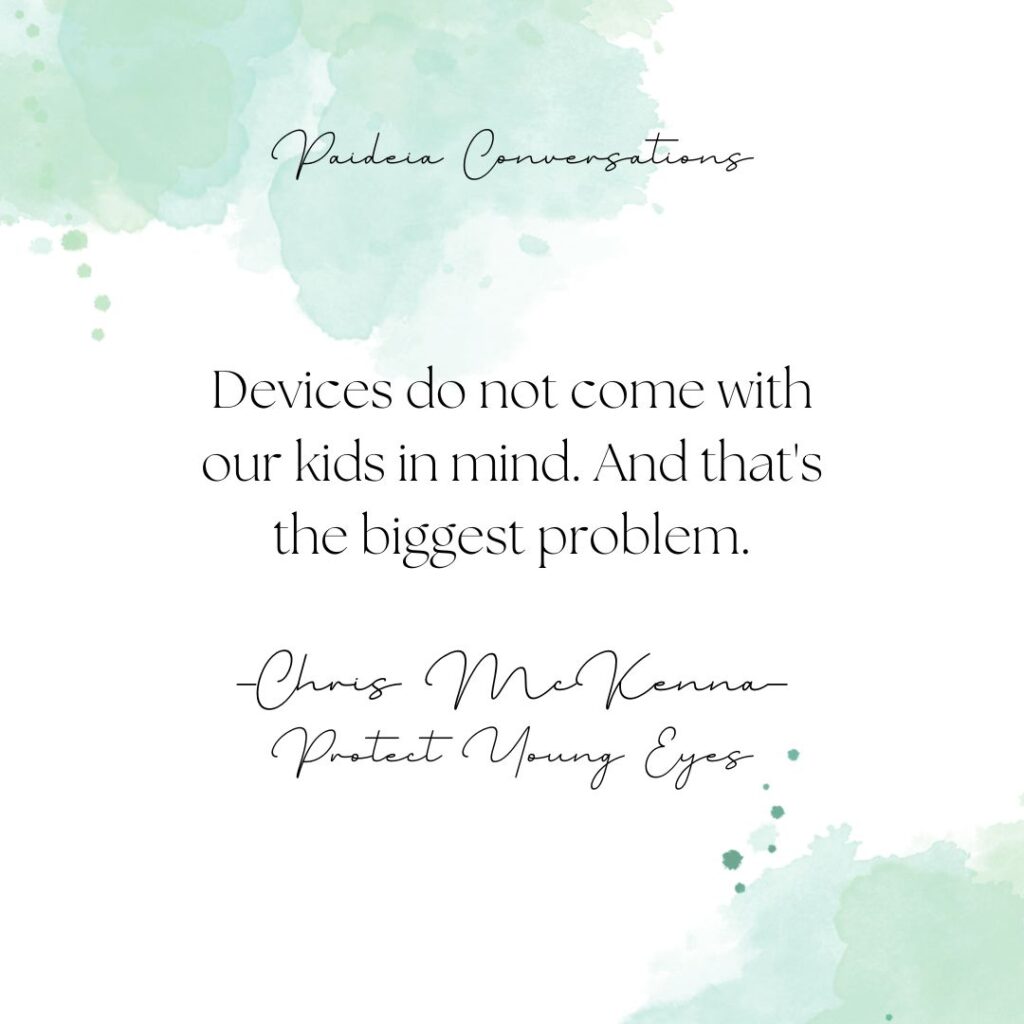
Melissa: you’re also a dad.
Chris: I am!
Melissa: so you have that parental perspective on things. And your kids are old enough to be involved in tech, right? What’s your age range of kids currently?
Chris: yeah, so I’ve got a… a picture, I know those listening won’t be able to see that I just pointed to a picture behind me here too Melissa, but yeah. We have four kiddos. My daughter Lauren is seventeen going into her senior year. And then I have twin boys, Cole and Grant, who are twelve and are going into seventh and sixth grade respectively. And then Blake is ten, soon to be eleven, and he’s going into fifth grade. So we’ll have fifth, sixth, seventh, and then twelve grade. My daughter is the only one who has anything “smart.” She has an iPhone that she got when she turned fifteen. My son Cole, he has a Gabb watch that he uses from time to time, which I love, because it has what he needs and it doesn’t have you know all the other baggage. It’s talk, text, GPS. And if he and Blake want to ride their bikes up to the speedway to get a slushie which is about you know four miles, or I guess four miles round trip, but two miles down the road, it’s great, I got the app, I can see where’s he’s at. And that’s about it other than you know what they use here in the house to watch YouTube on a tablet or use the ChromeBook for looking up you know different things. But yeah, we are, as we sometimes say, we are a pro-tech, pro-kid, protect organization. There’s a balance there, right, of? If we use maybe a Scriptural reference, it’s being in tech but not of tech or however it goes, right? [laughter] You know, we could play that out the same way. We want to embrace the good in it but definitely respect the life-altering power that it also can have if not used with diligence and with almost a sense of respect. Not because of I want to be like you, but because if I don’t defend myself against you, you could do me harm kind of respect. It’s almost like how you respect the power of a lion on the other side of the cage at a zoo. It’s like, I don’t want to hang out with you, I need to keep you over here, and understand that there’s danger. So.

Melissa: yeah. That’s one thing that my fourteen year old was asking me last night when I was talking to him about Protect Young Eyes. So he said, okay, we’re talking about protection and technology, but he said, what is it you want to protect us from? And I thought, you know, that’s a really good question to ask Mr. McKenna. What is it that we need to protect our children from?
Chris: so I would love to have your son listen to this. You know Melissa, when you and I were growing up, and I’m not sure you know age wise where we are, but let’s just say we grew up in a time probably both of us where the difference between the places in childhood that were helpful or okay or safe in my life back in the nineteen-eighties were different and very clearly separated from the parts of my world, my neighborhood, my community that were bad, harmful, and dangerous to me. They were things I had to go to if I were going to hurt myself or to do something dangerous. Or I needed a plan or I had to have a certain friend or I have to go to a certain house. In other words, there was a bit of intentionality that was necessary for most of my childhood. If I was going to do myself great harm or expose myself to something. So answering that question is twofold. It’s both situational and content related. And then when I would get to those places, there was content – be it sexualized content or violent content or content that was mature in nature that I could consume, but only after great effort to get there, to go to it. That is not the world that our amazing children live in anymore. We live in a mixed environment, mixed content world where all of the devices that we give our children that are intended to be used for good, and helpful, and God-honoring purposes – be it a ChromeBook for school or an iPhone to stay in touch, they also within that device have the same power to radically and at times almost permanently change the trajectory of a human being’s life. We think of the amount of evil that can take place in a digital device… it’s almost bottomless. And I’ve seen in my work and my time and exploration and research of… just as soon as I think I’ve seen the bottom of the pit of human depravity, I find that there’s another step lower on the ladder. And I experience something or see something and just go, my gosh, what have we built? And I know that ninety-nine percent of kids aren’t spending intentional time in those places. But at the end of the day, I’ve put those places in their pocket. And have just hoped and prayed that I’ve done enough that they don’t go there. And as a guy over twelve years as a consultant whose job it was to help large businesses all over the world mitigate business risk, I see everything through the eyes of risk mitigation whether it’s professional or parenting. I can’t bubble wrap my kids from the risk of the world nor would I want to because it wouldn’t prepare them for the fact that in this world you will have trouble, right? There’s tough things in this world, and I want them to be resilient and prepared to deal with people who just aren’t nice. Right? But there is an egregious harm that I will protect my children from at all costs. And it used to be very obvious where that egregious harm could take place, and that’s just not the case anymore. So I’m – I look at technology and I look at the devices and I look at the power in what I consider to be a super computer – this iPhone! It could land a hundred million Apollo 13 spacecrafts on the moon simultaneously, right? And I put that into the hands of my seventeen year old and go – amazing, beautiful daughter of mine, I love you, but I am –with shaking and trembling- placing this power in your hands, and I need you to work with me on this, because what dad… what kind of father would I be if I didn’t stay involved and if I wasn’t intentional about how you would handle this power? Because I’m letting a hundred million people into your life and that scares me. Right? So, I think parenting is different today. It has to be. And childhood is different today. It’s, it’s more difficult for amazing kiddos like your son or my daughter to toe that very thin line between the places that are good and the places that are harmful. It’s a thinner spot than the distance that existed in our childhood, if that makes sense.
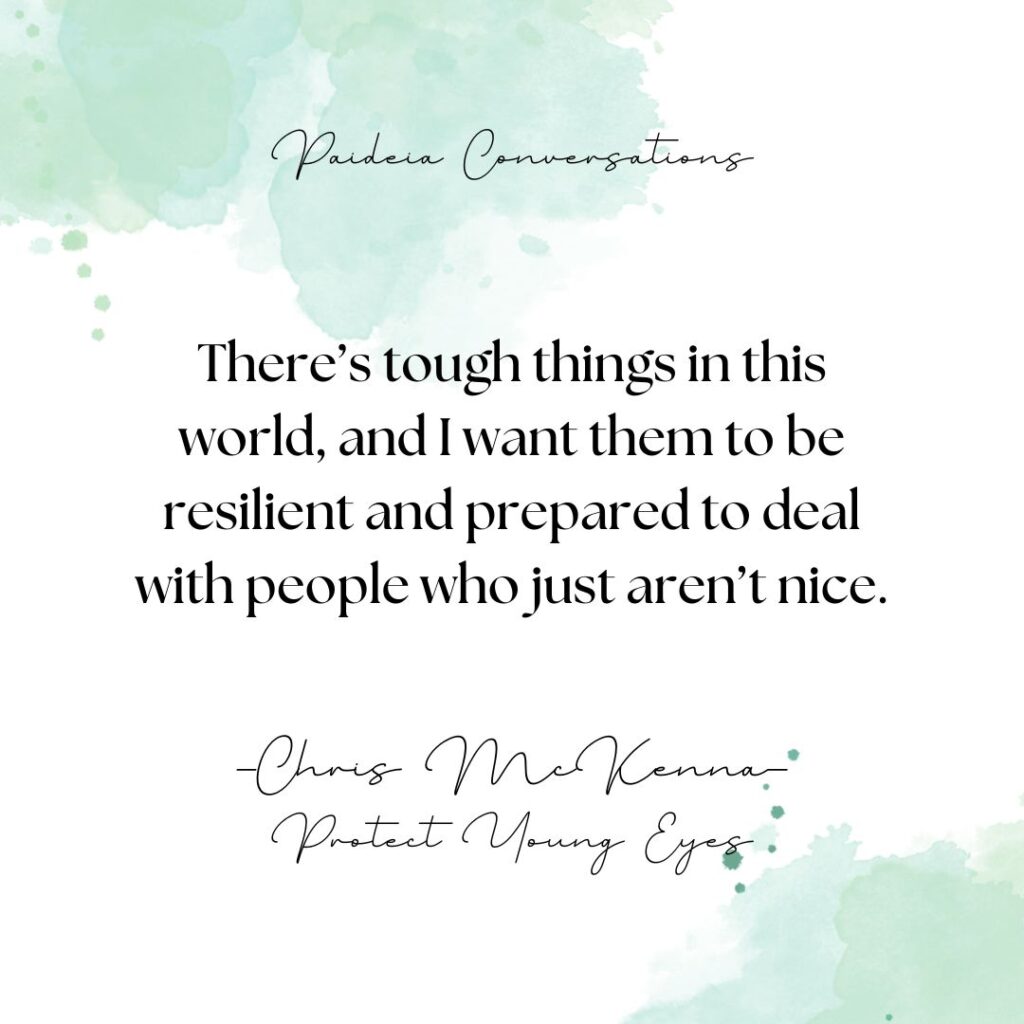
Melissa: yeah. Well, and stumbling upon something accidentally, um, you know – someone who back in 1989 was in the neighbor’s house, and you know, gave someone a magazine that belonged to their dad – that definitely shapes a trajectory, but there… there was some intentionality to that, right?
Chris: yes.
Melissa: then with my son, I… he, you know, he’ll be doing what he’s allowed to do on the laptop right there in the family area, and all of a sudden, you know, an ad will pop up. And he’ll just say, oh man, Mom, I should not have seen that. That was not appropriate.
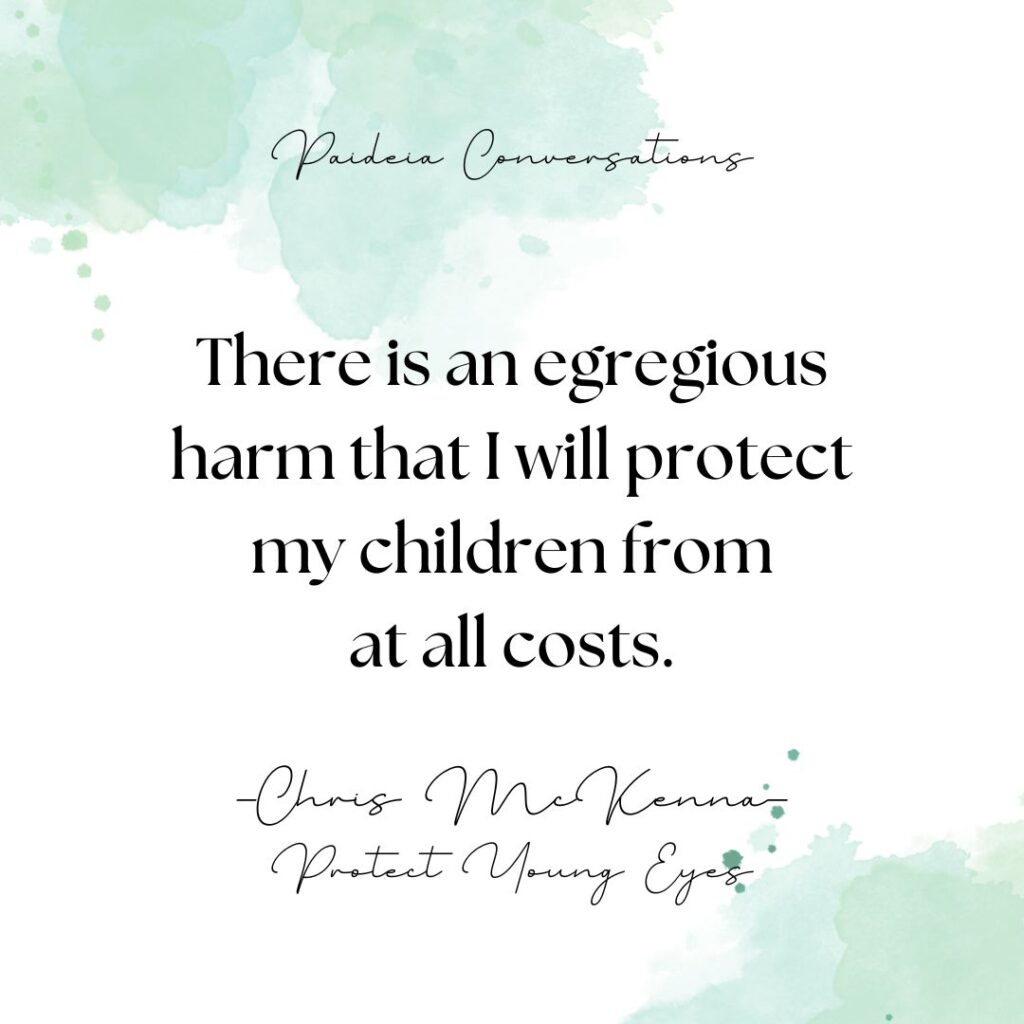
Chris: yeah.
Melissa: and he said, I didn’t try to look at that. And I’m like, I know!
Chris: I know, buddy. I know, buddy. And I love that his sensitivity around that is so pure and good and right. That’s amazing. And you know, that’s certainly something that we teach kids, you know, from K through 8th. You know, listen to that little radar, that little funny feeling in your belly that’s telling you something’s not okay. Ignore that little voice in your head that’s saying you’re gonna get in trouble, you can’t tell anybody. Listen, that’s a liar. I want you to listen to that little radar, that Holy Spirit radar that’s saying something’s not quite right here. And put it down and tell someone who has tools for that. To listen to that feeling, to listen to that little instinct. And I think kids, we maybe undersell them sometimes. I think a lot of kids know… they know where the, you know, what it feels like to be in the bad places. And because the “bad places” – and we could probably have, you know, different discussions around how we define bad, but I’m guessing that most of your audience would align with me in looking, say, to Scripture or just other, um, you know, solid references to know the difference between what’s good and bad, that which is helpful to our lives, things that are pure and good and honorable and praiseworthy and positive versus things that aren’t, right? And I think a lot of our kids, they know that difference too. I see it when I talk to them, where they know when I say to them, hey, third graders… I love third grade… I’ll say to them, hey guys, you know when you’re watching YouTube, is it really easy to see videos that you know aren’t good for you? And all of them just start nodding their heads. Like they know! Right? So it’s then giving them permission to respond to that, because I’ll say to them… I’ll say this as many times as I can… you know what, when that happens, that’s not your fault. That’s not your fault. Your first instinct is gonna be to be ashamed of that and I’m here to tell you that’s a liar. That is not your fault. And instead, I’m so proud that you have a sense to know that’s not bad, so what do we… or that’s bad and that’s not where you should be. What do we do with that? Let’s do something about that. Let’s find some trusted adult. You know, helping them to harness that as a power instead of a shame that is almost automatic because of that nature of ours sometimes, right? So those are conversations I love having with kiddos. I sense that in what you describe about your son. And praising that in sight of them, and saying that I don’t like that that happened, but I love your sensitivity about it. And I want to encourage that, buddy, because the pop-ups only get worse. And I think that’s… you know, this discussion about what’s good and bad. Porn is an Old Testament issue, right? [laughter]
Melissa: nothing new under the sun!
Chris: this is… nothing new under the sun! It’s just that the depravity, like the types of pornography, the, the violence, the exploitation of babies and children – like the types of things that are possible to be discovered through a simple search today… you almost couldn’t even put your hands on it without being in illegal places when you and I were growing up! That you couldn’t even get access to as a child! And so I think that’s the part that I want to empower parents with to create awareness. Not to create fear. I don’t want that to make us be paralyzed and not know what to do. No, no. If that’s your reality, now what can we do? And that’s where Protect Young Eyes loves to come in and say, okay, Mom, Dad, guardian, Grandma and Grandpa – you have digital superpowers, let’s do something about this and protect and prepare our kiddos for that world.
Melissa: yeah. I think that was something Greta Eskridge and I talked about last week, was you… prepare, protect, and pray I think were the three Ps…
Chris: that’s good, yeah.
Melissa: yeah, exactly. Now, I think you have the – with Protect Young Eyes, it’s five layers of protection, is that right?
Chris: yep, yep, we talk about the five layers of digital protection. Yes, good memory, good job.
Melissa: what are the… I feel like they all start with the same letter, and I can’t remember, is it C?
Chris: well, no, so there’s two different frameworks there that you’re referring to, which is awesome.
Melissa: okay.
Chris: we have the five layers. There’s a relational framework which is our digital framework, and those are five Cs. Then we have our more technical framework of how do we protect technically with five different layers, and those are the five layers. So what’s great is they fit together, because if you imagine a pyramid… so, imagine right now the, you know, the pyramids in Giza over in, you know, Egypt. A true pyramid. Imagine it has five horizontal layers in it, maybe each with a different color if that’s what you want. That bottom layer of that pyramid is the relationship. That’s our DigitalTrust framework, because everything technical sits on top of that. And the reason for that is, parents will ask me all the time: hey, my kid found a loophole, how do I close it? And I’ll say, well, wait a minute: before we try to fix the technical loophole, I always want to try to solve it first with the relational solution. There’s a heart issue here that your child feels it necessary to find a loophole, and they’re gonna find another one. So unless we get to the original side of why they found it and why you don’t feel equipped to talk about that, let’s solve that problem first. So that’s why the relationship has those five Cs, right? First we talk about Copy Me – are we modeling as moms and dads? Coplay – are we doing technology shoulder to shoulder, right? I want my kids to know that tech is a we activity, and not a me selfish activity, right, cuz one on one with the internet… whether, Melissa, it’s you or me, guy, girl, teen, whatever. We eventually all make a bad choice one on one. Those godlike algorithms are just too tough for us, so we need others involved. I want my kids to know what accountability looks like from a very young age. That’s Coplay. There’s Curiosity – that’s a parenting posture. I want us to be curious about why the kids do the things they do online. You learn a lot about kids just from their YouTube watch history. And then I want Conversations that are curious, so a ton of conversations. And the fifth one is Coaching. Not controlling but coaching. Because if you try to control them, they all become digital ninjas and they win. And so I want us to coach them through this. That’s the bottom of the five layers, and we build on top of that. Layer two which is the WiFi layer, that the router is the most important device in any home. Any home! And we talk about routers all the time. The Gryphon router is awesome. And then on top of that you build the layer of, um, device level controls, right? So because it’s not always connected to our router. You have smart devices that go places, or you have ChromeBooks that get used at a friend’s house now that are on that home’s WiFi network that maybe doesn’t have Gryphon, so what software is at that device layer? So layer two is a hardware deal, right, that router. But then layer three is a software deal with what are you choosing? Is it CovenantEyes, right? Is it Bark? Are you using Screentime from Apple? Are you using FamilyLink? Those kinds of things, right? And then the fourth layer there is what’s happening locationally. There are certain places where I just don’t want kids online, right? Buses, bathrooms, bedrooms, sleepovers, grandma and grandpa’s houses. They’re, you know usually a little less monitored because Grandma and Grandpa maybe don’t know quite as much. So I’m just, I get risk mitigation hat on. I’m mitigating risk differently in those five locations. That’s a layer of protection. I don’t want to put my kids as, what you often will hear, say in the Catholic churches – stay away from the near occasion of sin, right? Don’t put ourself where temptation is strong, and I think that at night, whether you’re fourteen or forty, when you’re bored in your bedroom with tech, that is the near occasion of sin. [laughter] And don’t be there! And then that top layer is the app layer. Meaning, TikTok, YouTube, SnapChat. What, if any, like in the case of SnapChat there’s not much. What, if any, app level controls exist? And it’s at the top and it’s the smallest point of the pyramid because they’re the weakest. So there’s a very intentional sequence in terms of strongest and most effective to necessary but less effective as you go up the pyramid. So that’s the meshing of those two frameworks at Protect Young Eyes after, you know, seven years and fifteen hundred presentations. Those are the sorts of things that seem to work.
Melissa: oh, I love that. It’s really logical and it’s really good, just visual picture. That’s great!
Chris: good!
Melissa: what about the… I also… I have this fourteen year old, and so he’s the one I have the most conversations with. Not only about tech because he’s into computer programming, and he’s trying to learn all kinds of graphic, like digital art kinds of things…
Chris: love it.
Melissa: but he’s the one I have most of these conversations with, but then I have a ten year old son – I also have nine year old daughter, and six and three year old sons, but sort of the older ones are the ones who, you know, love the tech the most and are ready for some of the harder conversations. But I have this ten year old, and I was thinking the other day, like, you have this “ten before ten,” um, catchphrase, right?
Chris: yeah.
Melissa: and so occasionally I’ve thought, oh I have a ten year old now. Have I had ten of these conversations with him? And I probably have, because I don’t actually keep track, we just have a [laughter] open conversational type of family. We homeschool, and so we’re just always talking about learning and growing and very curious, lots of endless questions… um, but, can you tell me – what’s that “ten before ten” thing about?
Chris: yeah, so it was inspired by my friend Ginny who runs a platform who maybe your audience would recognize called 1000 Hours Outside.
Melissa: oh yeah.
Chris: right? Yeah, so she’s awesome. She lives here in Michigan, a couple hours that way from me. And so the quantification of what she does is sticky. So I was like, how does that apply to my work? One day I was like, okay, ten before ten. I want, and you know, I’m a CPA by nature, so I love numbers. They just sort of help me make sense of the world as you can tell. Five layers and frameworks, and that’s just the way my brain works. And um, but I want ten conversations about pornography before age ten. Now, when I say that, automatically there’s this: oh my gosh! I don’t know how to have one of these talks let alone ten of them! And that’s a, that’s an okay thing to think. You’re not alone. A lot of people think that. But I think, and if you know, anybody here listening to this is on Instagram, there’s a reel that I created that’s called “That’s a Porn Talk.”
Melissa: mhmm.
Chris: and it dismantles the idea that a porn talk has to be some powerpoint presentation with research and graphics, and they’re sitting down and listening, and they applaud when you’re done, like that sort of thing. [laughter] That’s not what I’m talking about.
Melissa: right.
Chris: there is a wide list of things that qualify as a porn talk, without ever saying the word. And I think that’s the part that gets in the way mentally as a parent. You’re like oh gosh, I gotta say that word? No, no, no. What I’m more concerned with is, number one, that kids know what it is.
Melissa: mhmm.
Chris: and then nine times know what to do when they see it.
Melissa: yeah.
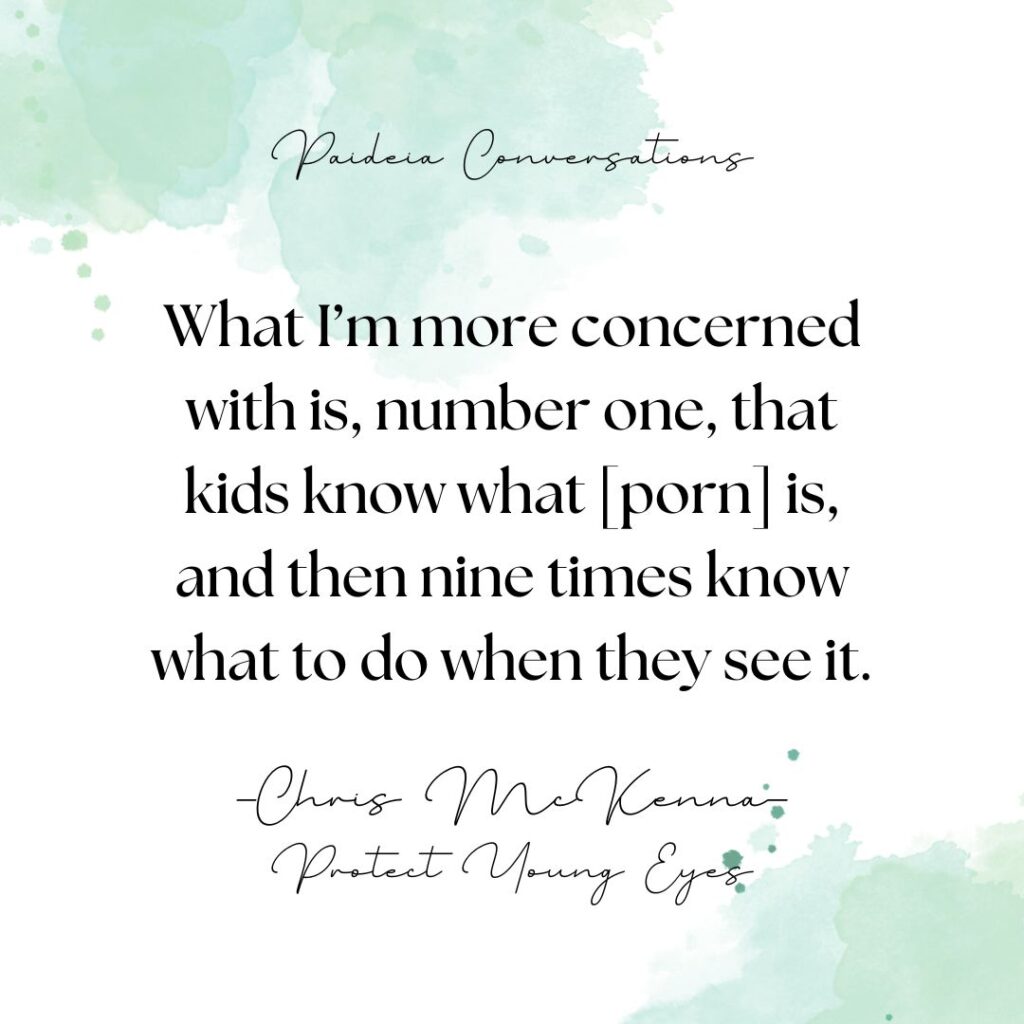
Chris: right? Because another reel, you know if people were to watch, um, is called “Practice Practice Practice.” Right? People can find these on our Instagram account. We put a ton of really, I hope, really helpful content out there. I’m always scheming about the next thing I can put out there on Instagram because 93% of our followers are amazing moms like you. The moms that are you know, I call them the chief technology officers of the house. That’s what you are, right? And so I want to equip the 93% of our followers that are Melissas with as much good content as possible.
Melissa: we appreciate that!
Chris: yeah. But I want them to be practiced, to know what to do, and to break through that little lying voice that in the moment is gonna convince them not to say anything. Because to tell a kid, hey if you see porn, talk to me – that’s almost meaningless in the heat of the moment. Because little, well not little, but pre adolescent and tween brains are highly tangible. They don’t do well in the abstract yet. You know this as a homeschool mom, right? That making it as tangible and as tactile as possible is gonna make it stickier in their brain. That abstract thinking develops as that prefrontal cortex finally starts rolling around there in the teen and early twenties. But before that make it as practical and hands on as possible. So I’m telling parents, hey, like roleplay this bad boy. Like, get in the van, go out in the road, pull into the driveway, walk in, and have them pretend they saw something and have them pretend tell you exactly what they would tell you what they did when you walk in the door. I know it sounds corny but I’m telling you it works. And it overcomes some of those neural-chemical barriers that in the moment of seeing porn are super powerful. And really disconnect all rational thinking. Because that rush of neurological activity just… there’s nothing happening in that prefrontal area to help them make wise decisions. But they can fall back on, oh I remember, like right now I’ve got to walk over, because I’ve walked in practice five times over, you know, last year. I need to walk over and now say something to my mom because that’s exactly what she’s taught me how to do it, or what to do. Right? So those are the sorts of things that I think are far more effective than having some in-depth, awkward conversation about pornography. [laughter] So.
Melissa: yeah. I love that. Well, and you know another thing. Well all of your catchphrases are obviously very sticky because they’re the ones that I remember. The whole “delay is the way…”
Chris: yeah. Good!
Melissa: so, my… I’m picking on my fourteen year old here… you know, he talks about, um… my fourteen year old talks about how when he’s sixteen he’s going to buy a care, he’s going to have, you know a job. Right now he works parttime during the summer, and I drive him, and so he doesn’t need to take a phone with him. But when he drives himself, you know, we’ve told him, yeah we’d like you to have some kind of accountability and safety measure in your pocket. So the question has come up, like, oh well, by the time he’s sixteen do we give him a straight up iPhone or is that the age where a Gabb phone is still appropriate? And I know there’s no, like, one blanket answer for every child and every family and every situation.
Chris: right.
Melissa: so how do you… how do you find wisdom in that? How do you recommend parents to walk wisely through that when we want him to make mistakes while he’s still at home? While we still have, you know, these eleven PM conversations without him being off at college yet. [chuckle]
Chris: you know what I would offer, as an answer to your question, Melissa? Is I would have the exact same conversation that you just had with me, with him.
Melissa: mmm.
Chris: I can’t tell you how many times I’ve had a parent come up to me and go, you know what I don’t know how to talk to my kid about this and this – this is what freaks me out about this thing, and I’m so afraid that if they have SnapChat or Instagram that someone that they don’t know is gonna talk to them, and they’ll send a picture they don’t know – help me with this, Chris, what do I do? And I’ll just sit for a minute and I’ll smile. And I’ll say, have you ever told them everything that you just told me?
Melissa: huh.
Chris: and they’re like, no! I’m like, all the things that you’re afraid of, all of the concerns that you have… what about inviting them into that? Because here’s what will happen when you do that. Number one, they’ll kind of go, okay, um, I understand where my mom’s coming from. It’s because she loves me, not because she’s a bad mama. Right? She has genuine concerns for me. Number two, any time you can invite a child into the solution and give them agency in that situation, that’s a part of the Coaching in the DigitalTrust framework. It automatically increases their buy-in into what you’re saying. It’s true for all of us, right? Think about marriage! [laughter] It’s always better when it’s their idea. [laughter] Right? Right? I could say something to Andrea like, you should do this, this, this, and this! That’s my wife. But if she comes up with it, even if it’s the same as what I said, it always goes better! [laughter] And it’s just the way we are, right? We want that agency, that ownership. And so those are things that I’ll say to parents. And I would invite you to have that same exact talk – hey, bud, you know, an iPhone might be right; here are some of the risks around it, here’s what I’m concerned about this. You know, here’s a Gabb phone. I understand that this maybe feels too juvenile for you. But at the same time, it’s not gonna provide some of these temptations as the iPhone. Here’s my tension as a parent. Here’s what I’m struggling with. What do you think?
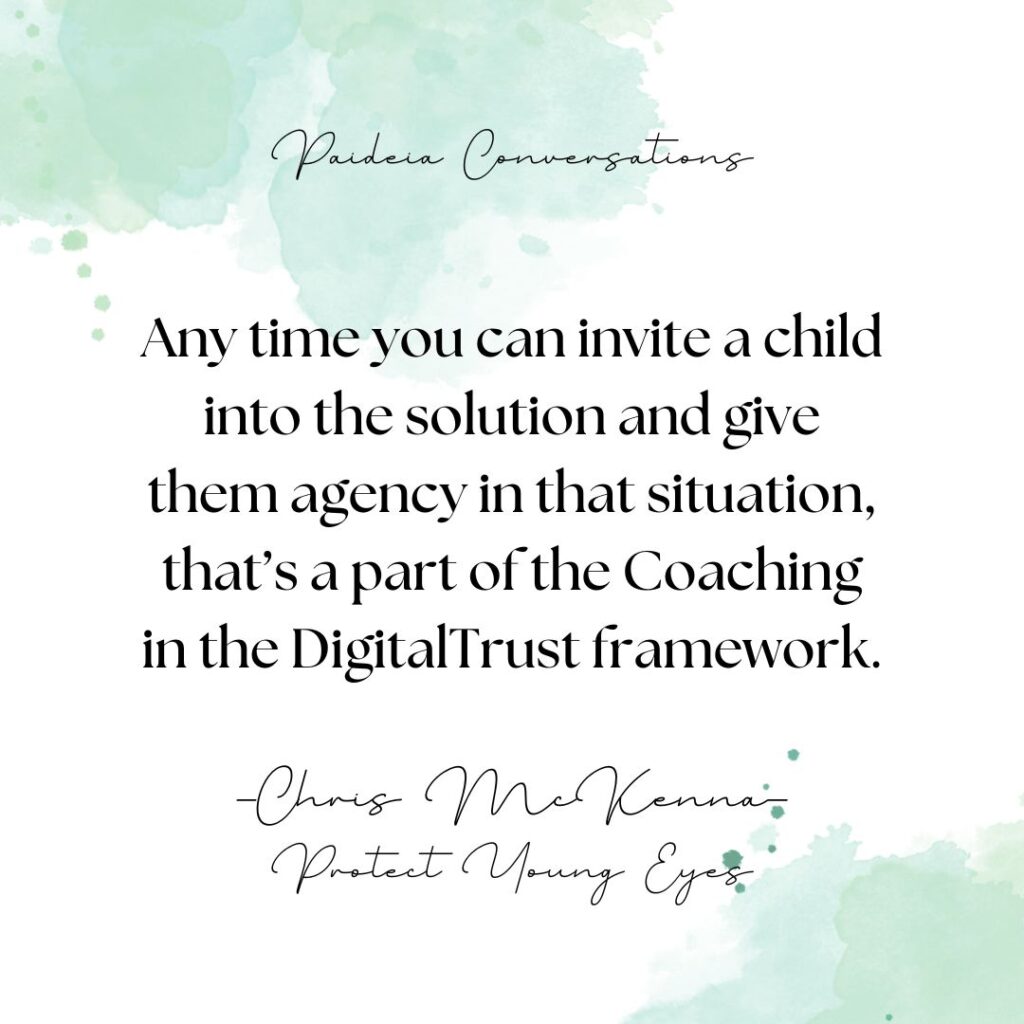
Melissa: yeah.
Chris: and I think if you’ve had a lot of conversations along the way, and you, you know are open and honest. I think there’s a ton of power in that kind of conversation. You know what I mean?
Melissa: yeah, yeah. I like that you’re big into communication. Communicating with, you know, you – your job with parents, and schools and churches, but then also encouraging those parents to be communicating with their kids. So I must think that you’re big into – you know you say 93% of your followers are the moms…
Chris: yeah.
Melissa: then, I know I, I talk to my husband about… he’s never, he doesn’t have Instagram, so he doesn’t look at your stuff like I do. But I share it with him, you know. I’ll say hey, check out this reel or hey look, here’s Chris talking about something else. So he knows who you are even though he’s not on that social media platform. But having these conversations, um, as yeah, husband and wife, in wanting to move forward with our kids is also huge. Having that communication.
Chris: yeah, that alignment is big, because as parents it’s important… and Andrea and I have these conversations all the time… who would be best to have this conversation with Lauren? You know, sometimes it’s me, oftentimes it’s Andrea. You know. Kids, as you know, go through different phases of attachment with Mom or Dad, depending on phase of life or maybe gender, all those things. And those are really important cues for us as parents to pick up on. And to, to honor that, and to not feel intimidated by that, and um… yeah, I think that’s, especially with these topics which are so often topics of the heart, and who is in the best position to do that? Very seldom, I’ll offer this, I think it’s very seldom both at the same time. Because that can feel a lot like an inquisition to a child. And I want to be, you know, cautious of that. So you’re right. I think it just sort of depends on who is best positioned to do that. But being aligned, because, when and if the opportunity comes up to have to enforce something that consistency is really important. Or if you’ve got a kid who’s gonna kind of test that mom said versus Dad said, you know you do kind of need to be kind of on the same page for sure. So I’m glad you’re… there’s plenty of dads on Instagram too, but if not, and your husband isn’t, then I give you full permission to put your phone in front of his face and say, watch this – you gotta watch this. Because there’s a lot of power in that alignment.
Melissa: yeah, yeah. My husband, speaking of husbands. You know, he had two questions. One of which is, how does a filter actually work? Like on the technical side, how does a filter filter the internet? How does that work in protecting our kids?
Chris: well it depends on the service, the filtering service that’s in place. So there are known domains – when I say domain, uh, like a website address, that top, you know, www dot whatever dot come. The www isn’t even really used much anymore. But for all, for us old people, we remember that version of the internet, right?
Melissa: right!
Chris: so there is a library, um, that when websites are registering, I’m just gonna explain it high term, you know, high level terms. Let’s just say there’s a mechanism by which many, not all, certainly not all, but many websites are categorized as either explicit or not. And there are other categorizations based on keywords used in the website on, is it related to gambling? Is it related to guns? Is it related to other categories? And there are services, say like the Gryphon router, where um sometimes there’s you know, the filter is on, and it’s leveraging what Google or Bing or DuckDuckGo, other search engines have done to recognize this categorization, typically those are just at the sexual or not sort of level. They’re less concerned about filtering out other types of content. That’s where a service comes into play, say like CleanBrowsing or even Bark or others. Where you have more granular categorizations of websites that they’re picking up on based on keywords and other things that if parents want to filter out, even like lingerie, or that kind of thing. So it’s very much on that technical side, what keywords are being used, and that categorization that those solutions are filtering in that way, so.
Melissa: so the other, the other question that my husband had was on the question of sort of screen addiction. So not necessarily relating to filtering particular content, but the idea of how do we protect our children – and again, I think it goes back to communication, right? Having these constant shoulder to shoulder experiences and conversations. But do you see a certain number of hours or is it just all about attitude? Is it only that pleasure screentime goes into too much time, because you know, what about, oh my kid has to watch YouTube videos for homeschool co op history stuff or [laughter] you know, how does… how do you encourage parents to walk with wisdom when it comes to that type of thing as well?
Chris: yeah, what constitutes screentime, right?
Melissa: right.
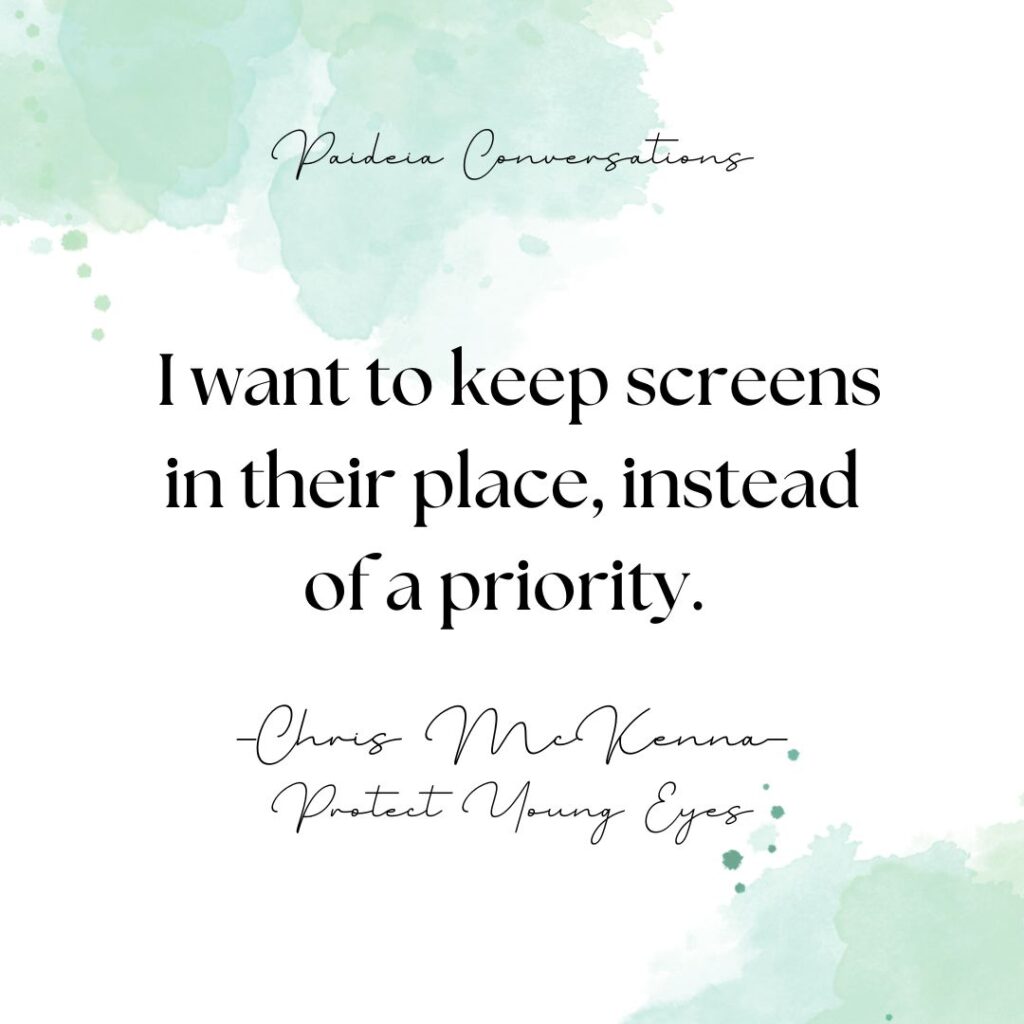
Chris: how do you categorize it? Is it junk food? Is it nutritious? It’s really hard to know these days. So I, in the McKenna house, do not keep track of hours, it’s too stressful, I can’t do it. It’s, I quit that a long time ago. So, but I’m also, you know, so there’s some non negotiables in that, right? So again, location matters. I’m trying to keep devices out of bedrooms. I’m trying to keep devices out of private, dark places. I’m trying to keep devices away from a certain proximity of bedtime so it’s a bit of a cleansing of the mind, right, a settling down. I’m trying to keep screens maybe away from a automatic sort of morning necessity of, hey, have you had breakfast, did you get dressed, did you brush your teeth yet? Let’s prepare our bodies before we just jump into a screen, right? So there’s just some routines around that. I want to keep screens in their place, instead of a priority. And that’s just some things as parenting that I’ve chosen to do instead. I am certainly focusing on patterns of behavior more holistically around, are they interactive with me? Will they… this is a big one… can I interrupt their screentime without eliciting anger?
Melissa: mhmm.
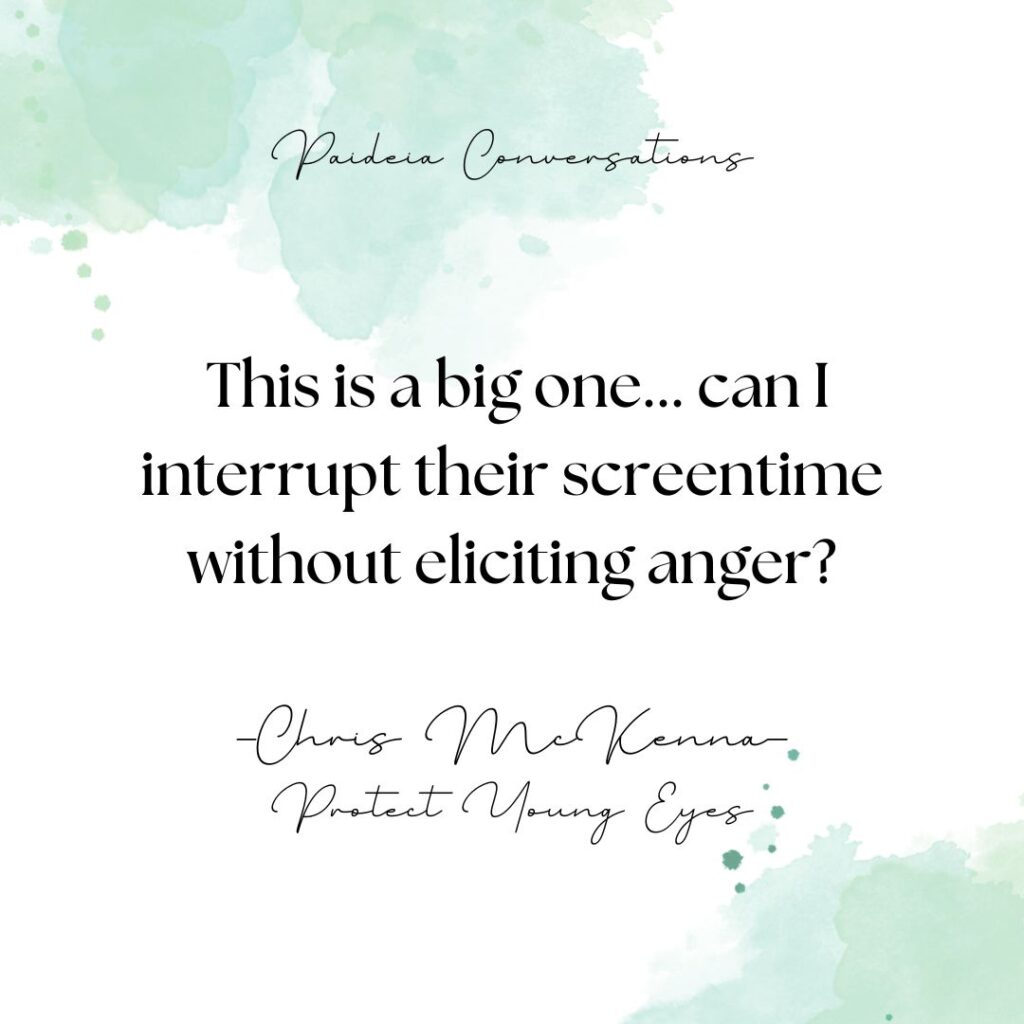
Chris: and I practice this one with my kids all the time. I love Cole, my twelve year old who walked in, he will tell you, most recently… I do this all the time where I’ll just randomly ask them to fill the dishwasher, I’ll randomly ask them to take the recycling out. No matter what they’re doing on a screen, if they don’t within a pretty quick three second window say, yep! and pause it and react to me, then I’ll take it away. You know, I’ll turn it so they, they’ve, um, through practice and through trial and error, have learned that that’s not… my initial reaction to that isn’t anger, it’s diverting it towards help knowing that when I help Dad’s next response is almost always, go ahead and keep playing. Right? So it, there’s a training… you gotta remember that these little brains, they don’t stand a chance against these screens. And so when a kid is starting to exhibit certain, uh, negative or sort of attachments to the screen, it’s easy for us as parents to take that personally or pin it on them, that they’ve done something wrong. And I want to, I want to get rid of that way of thinking. Because if we were twelve, we would be reacting the exact same way if that sort of glow and, you know, constant stream of entertainment was in front of us, we would have done the exact same thing. This is not a me versus kid thing. This is a screen versus the brain thing.
Melissa: mhmm.
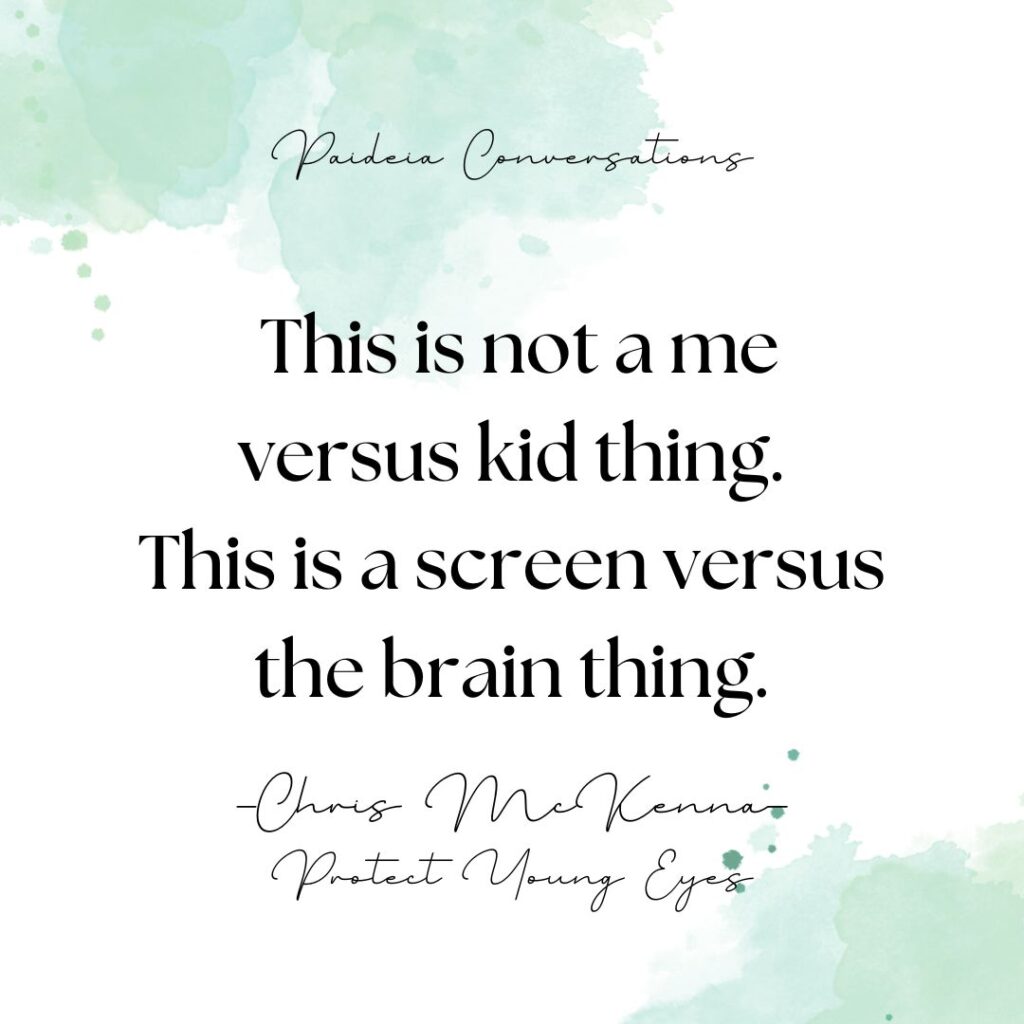
Chris: and I think that depersonalizes it a little bit from me getting angry at their response, and instead seeing it as an opportunity to go, all right, bud – boy, when I interrupted that game, dude, you got ticked! So let’s talk about that. Why did that happen? You know, I’m gonna, I’m gonna take it away for a little while because, you know, if I was doing something that made me a bad dad, wouldn’t you say, Dad, that needs to get put away? Yeah. So that’s what I’m doing. Cuz I’m trying to be a good father to you. But let’s think about what just happened, okay? You threw that controller, or you yelled at your brother, all right? That wasn’t the right reaction. But it’s something that I’m not mad at you for. Because that’s the power this stuff has over us. So I’m not gonna punish you for it, right? But the next time I interrupt that game to have you do something, I want you to react differently. And when you do, and you get the thing done, I’ll probably say, go ahead and pick it back up, man. Right? Because this is training. And so I want that to maybe shape the way that we respond to screen time a little bit. Look for those cues. Some kids can’t handle it. I mean, just in the way that God has put them together, they have a sensitivity to their dopamine reward system that is ten times greater. It can even be in the same family, we’re like my gosh, this kid reacts this way and this kid reacts this way. That’s just us recognizing those things as parents and, you know, tailoring their consumption of screens accordingly. And so those are just some things that I tend to focus on when it comes to screen time. Instead of…
Melissa: physiologically speaking, I mean, we are… we are chemical, physiological, created beings…
Chris: we are!
Melissa: and that’s complicating in some sense.
Chris: well, and I want parents to hear that there isn’t this magic line that if you’ve decided that thirty minutes is okay that now you’re a bad parent at thirty-one. Like there’s, I want there to be a freedom in that too for moms who, let’s admit, because I know many of you that guilt is always right around the corner, right? That there’s nothing that says that if your kid gets thirty-one minutes that you’ve created this sort of fictitious good parent bad parent boundary with screen time. Like that’s the stuff I just want to get rid of, because that’s toxic to us as parents too. And just change that mindset. So it’s, it’s good I think for both of us to switch that up a little bit.
Melissa: well yeah, that’s what my kids are doing right now so that I could have a quiet conversation – is, they’re watching a Magic School Bus. The younger ones, watching a Magic School Bus.
Chris: there you go.
Melissa: you know, we have to realize that screens aren’t inherently bad. It’s how we use them and how we walk relationally with our kids through that.
Chris: yep.
Melissa: my fourteen year old last night said, how can you prove to me that my brain is effected by screens? And I told him I had just read a book called The Teenage Brain, and it did not come from a Christian worldview, so it was, you know, a chew and spit, grain of salt kind of thing. But it was very convincing in the physiological brain development of adolescents, teens, even you know young adults. And I said, I don’t know, I can’t regurgitate that information for you right now, but trust me, I know it really does.
Chris: yeah, we are. We’re integrated beings. Mind, body, and spirit. And that’s why I want us to, you know, protect those, those areas of our life. You know, you said something just a minute ago that I just, I just want to mention. Because I think there are a lot of things that maybe were true that are less true today, but a phrase like that technology isn’t inherently bad.
Melissa: mhmm.
Chris: that’s a phrase that is definitely worthy of discussion. Because I think that was probably true in the days when technology was something I consumed, as opposed to something that’s studied and consumed me.
Melissa: whoa.
Chris: and there’s a difference today with algorithms that are actively tailoring themselves to us that I would argue that our technology is less and less inherently neutral than it used to be. Physiologically for the exact reasons as it drills deeper and deeper into our brainstem, and our deep needs, that three parts of our brain that are asking three different questions of am I alive, am I loved, and am I thinking? As it drills deeper into eliciting those sort of, am I alive, say like heartrate, blood pressure kind of responses to what I’m seeing, it gets its hooks more and more into us that other ways that I think we could have conversations more scientifically is along those lines. To go, you know, there are engineers at companies, tech companies now that engineer products to elicit a physiological heartrate blood pressure response in you. Because that is the reptilian part of our brain, deep in our stem, and they know if they can do that and then attach a reward to get out of that, because your brain doesn’t like living in that state of stress… dude, they’ve got ya. Dude, they’ve got… I think those are good conversations that kids are fascinated by when you invite them into it.
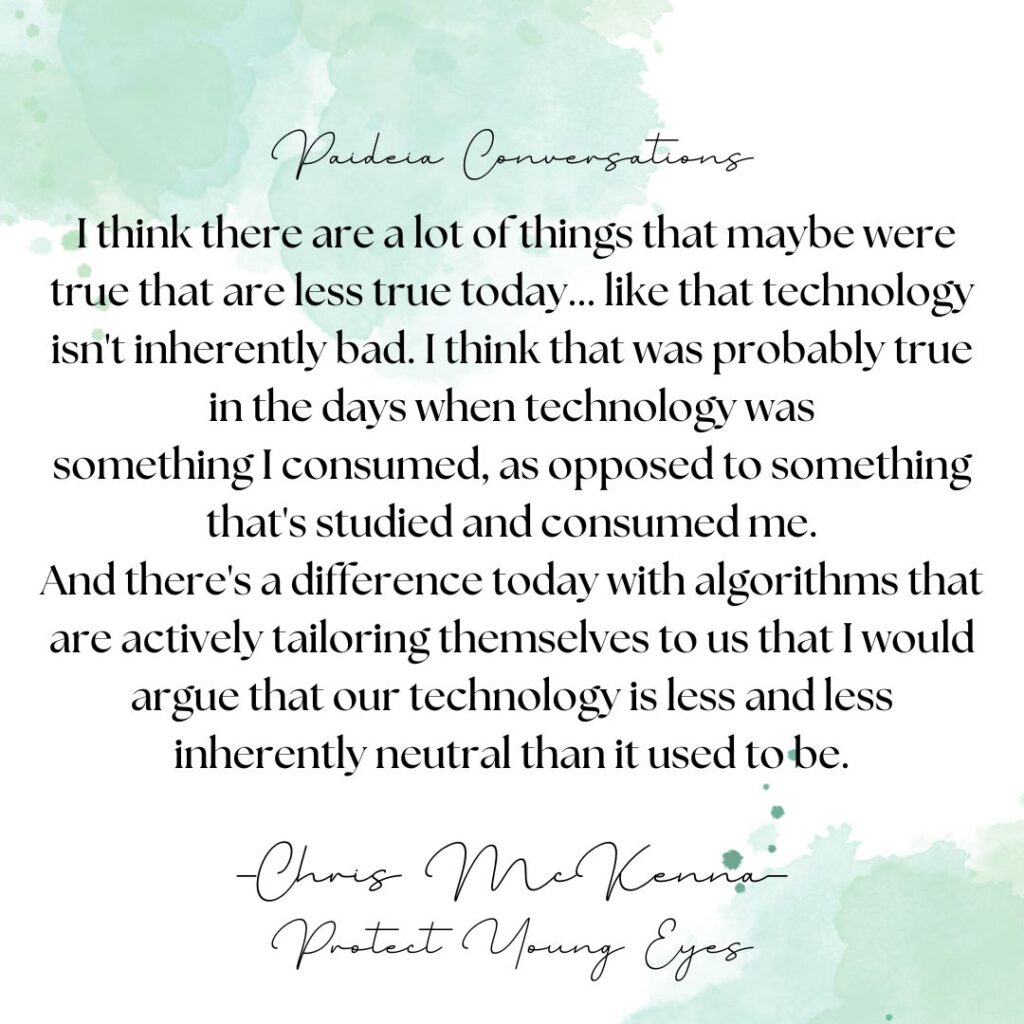
Melissa: I’m fascinated by that! My mind is kind of like blown right now.
Chris: yeah, there you go.
Melissa: okay, you think, oh well, alcohol or um, I don’t know, sexuality, those things you know – is it a virtue, is it a vice? I’ve always sort of put, um, technology in that same kind of camp, but yeah the whole algorithm thing, you can’t get away from that.
Chris: yeah, so.
Melissa: crazy.
Chris: there you go, we’ll end on that, right?
Melissa: something to ponder with my husband, yeah. So as we sign off, can you rattle off three top tips?
Chris: yeah! Um, you know, again I would say whenever you have a technical issue you’re trying to overcome, some loophole something, try to solve it first with a relational solution, that conversation. Number two you would be, hug your router. Go hug it, love it, make it work for you. It can carry some of that burden technically that I think is so, so important. And then number three, I would say, if you think it’s hard being a parent in the digital age, it’s even harder being a kid. Keep that empathy high. It is a stressful, anxious, information overload time to be a child. And the things of the world that stress us out, whether it’s politics or war or pandemics – they see it and feel all of it, too, with much fewer, with fewer tools to process it. So I just want us to keep that empathy high for what it’s like to be a kid these days.
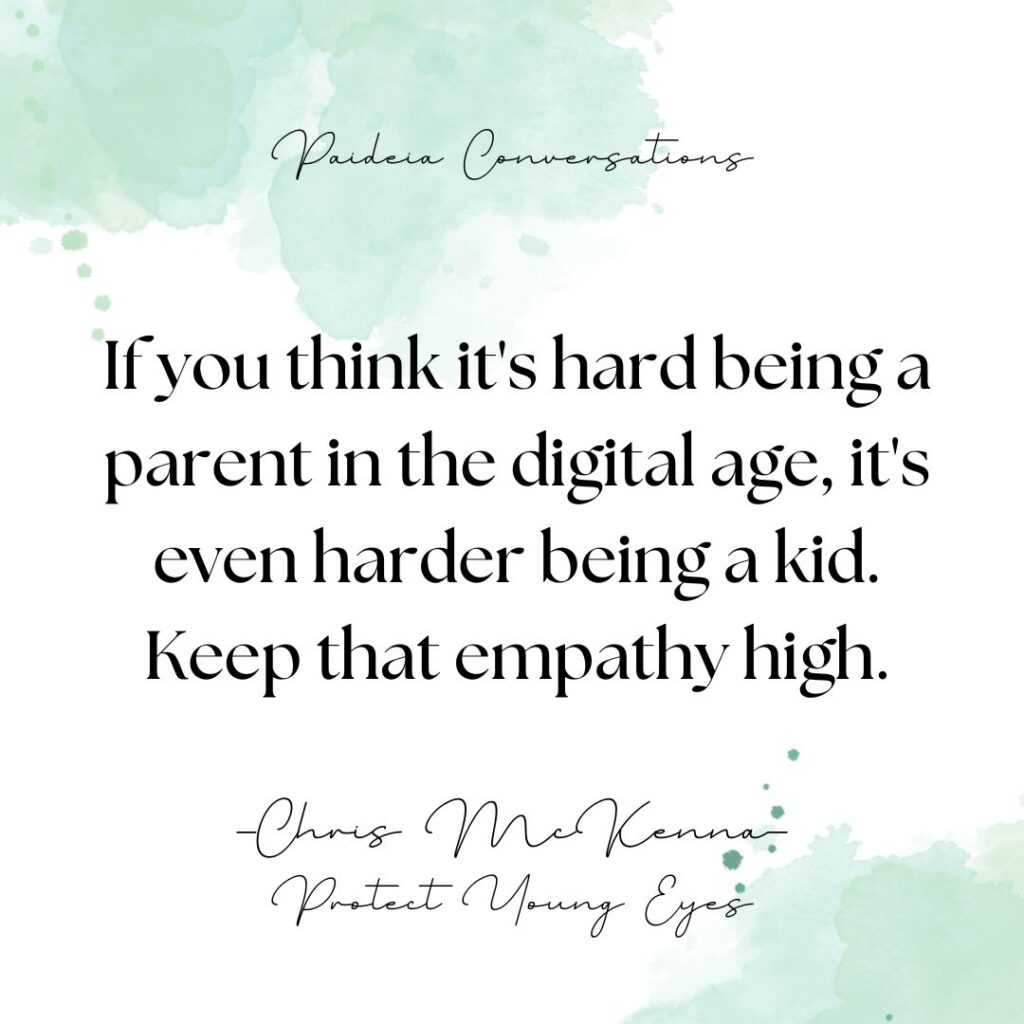
Melissa: yeah, yeah. Well thank you so much for taking the time to have a conversation with me, and to share these thoughts. I can’t wait for my, my kids, at least my two older ones, to jump in on this and listen in. We’ll have more conversations together.
Chris: sounds good. Yeah, you’re welcome.
Melissa: thank you so much. I’m really, really grateful we were able to make that work.
Chris: yeah, me too, Melissa. And for anybody out there who hears this, we love answering questions, we love tackling tough tech problems if you’re stumped on something. So just send us a message at our website at Protect Young Eyes dot com or a direct message through social media, and somebody will get back to you.
Melissa: and you do. You guys are quick. So all right, thank you, Chris.
Chris: you’re welcome! Bye bye.
Melissa: and that brings today’s conversation to a close. You can find more encouragement and conversations on paideia at PaideiaNorthwest.com and PaideiaSoutheast.com for encouragement and ideas about raising your children in the nurture, admonition, instruction, and discipline of the Lord. Please join me next time for another paideia conversation, and in the meantime, peace be with you.
